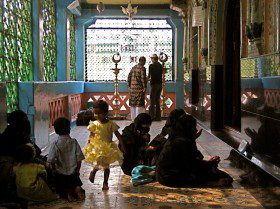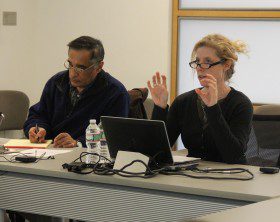By Abhishek Rahman, MDiv Candidate, Harvard Divinity School; SAI Student Coordinator
The context in which the conversations on secularism have been happening for the past twenty years in India are crucial to understanding what it means to live in a democratic, multireligious, and complex society.
According to Anna Bigelow, Associate Professor in the Department of Philosophy and Religious Studies at North Carolina State University, the conception of secularism articulates the place of diversity within Indian polity and helps in understanding what Indian secularism means spiritually and practically.
On March 12, Bigelow spoke on “Sufi Shrines and the Secular State,” a SAI Muslim Societies in South Asia seminar co-sponsored by the Prince Alwaleed Bin Talal Islamic Studies Program at Harvard. The seminar was chaired by Ali Asani, Professor of Indo-Muslim and Islamic Religion and Cultures, Faculty of Arts and Sciences and Director, Prince Alwaleed Bin Talal Islamic Studies Program.
Bigelow argued that the complex nature of the usage of secularism is revealed in moments of encounter with the other – and it has consequences. Drawing from examples of two Sufi religious institutions in southern India – Baba Bunden Shah Dargah and Dargah Hazrat Tawakkul Mastan in Karnataka, Bigelow said that visiting the tombs of Muslim saints is a practice for people of all religions which makes encountering the ‘religious other’ possible at these sites.
“We see the presence of people of other religions at these sites which adds to the efficacy of the site and its power,” she said.
However, Bigelow added, “the ability to control the religious meaning of these sites is deemed important to control the secular nature of Indian polity,” the reason she offered for the different interpretations of secularism in the country.
She categorized the various interpretations of secularism as following – separation and division, anti-religion and disconnected, anti-majoritarian, and interaction and inclusion.
 Bigelow saw secularism being articulated as separation and division at Baba Buden Shah Dargah in Chikmagalur, which is alternatively known by Hindus as the Swami Dattatreya peeta.
Bigelow saw secularism being articulated as separation and division at Baba Buden Shah Dargah in Chikmagalur, which is alternatively known by Hindus as the Swami Dattatreya peeta.
She encountered both Hindus and Muslims having different legends attributed to the site – Hindus believed that Swami Dattatreya had meditated at the site while Muslims believed that a Sufi saint had meditated at the site and his disciples were buried there.
In spite of amicable relations between the two groups for many years, Bigelow blamed the rise of Hindu nationalism in Karnataka as the source of religious strife between Hindus and Muslims, resulting in tensions over site management.
After the victory of the Bharatiya Janata Party (BJP) in Karnataka, Bigelow said, “The state decided that the site couldn’t be located by any of its Muslim names except as Datta peeta.”
At the Dargah Hazrat Tawakkal Mastan in Bengaluru, Bigelow observed the articulation of secularism as interaction and inclusion; resulting from encounters between this Sufi shrine and a Hindu temple for goddess Draupadi located two kilometers away.
“During the annual Karaga festival, the image of goddess Draupadi is taken on a procession around the city. The highlight of this festival is when the procession stops in front of the Sufi shrine and lemons are exchanged between leaders of the Sufi Shrine and the Hindu priests,” said Bigelow.
Bigelow noticed that Hindus and Muslims had multiple narratives about these sites and shared different stories about why the goddess stops in front of the Sufi shrine. However, she was intrigued by learning about the efforts made by the two communities to meet each other and make these narratives mutually available in spite of being differently constructed.
Bigelow contended that the multiple meanings of secularism in today’s India result from the abstract nature of the debates on secularism at the time of India’s independence. In her opinion, it is “individuals and collectives that shape secularism as inclusive or exclusive.”
“It is a complicated and fascinating process which influences personal practices, state-level discourses, and everything in between when things are in flux,” she said.

